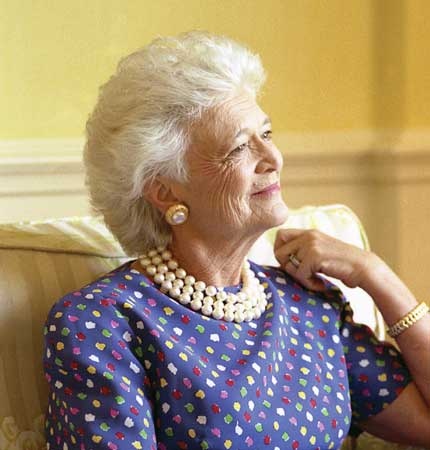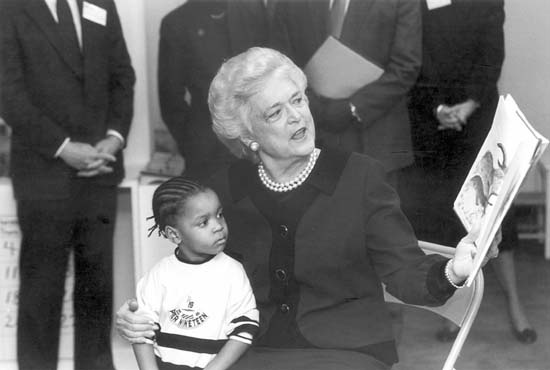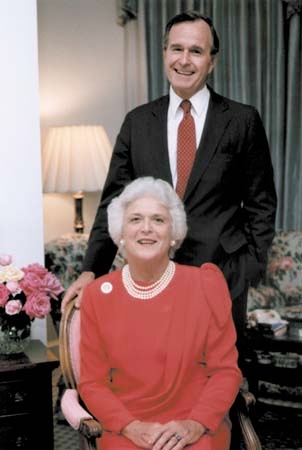Bush, Barbara
American first lady
née Barbara Pierce
born June 8, 1925, Rye, New York, U.S.
 American first lady (1989–93), the wife of George Bush (Bush, George), 41st president of the United States. One of the most popular first ladies, she was noted for her charitable and humanitarian efforts.
American first lady (1989–93), the wife of George Bush (Bush, George), 41st president of the United States. One of the most popular first ladies, she was noted for her charitable and humanitarian efforts.Barbara Pierce was the daughter of Marvin Pierce, the publisher of McCall's magazine, and Pauline Robinson Pierce. She was not the first in her family to end up in public service; she was the granddaughter of an Ohio Supreme Court justice, and her father was distantly related to Franklin Pierce (Pierce, Franklin), the 14th president of the United States. Growing up in the affluent suburb of Rye, New York, Barbara and her three siblings enjoyed many advantages. After public elementary school, “Bar,” as she was called, entered the private Rye Country Day School and then Ashley Hall, a private boarding school in Charleston, South Carolina, where she graduated in 1943.
While visiting home on Christmas vacation in 1941, Barbara met George Herbert Walker (“Poppy”) Bush. Their courtship proceeded in spite of the distance between their two schools, and they became engaged in 1943, just before George left to serve as a naval bomber pilot in the Pacific. He was shot down on September 2, 1944, and for more than a month she did not hear from him. They married on January 6, 1945, a date rescheduled to fit his leave. Not yet 20 years old, Barbara Bush was one of only a handful of first ladies to marry in her teens.
Several months after their marriage, when George resumed his college education at Yale, Barbara took a job at a campus store—the only time she held a paying job. Their first child, known as “George W.,” was born in July 1946. Two years later, after George graduated, the couple relocated to Texas in search of better economic opportunities, the first of many moves connected to George's business and political career. By the time she moved into the White House in 1989, Barbara counted that she had lived in 29 different homes.
The death of their four-year-old daughter, Pauline Robinson (“Robin”), from leukemia in 1953 caused the couple enormous grief. Rejecting the physician's advice to let her die peacefully, they sought aggressive treatment, only to see her die seven months later. Barbara often credited her husband and children—another son, John Ellis (“Jeb”), had been born just before Robin became ill—with helping her through that difficult time. It was during this period that her hair turned prematurely white.
Barbara spent most of the next two decades parenting. Because her husband's oil business frequently took him away from home, responsibility for raising George W. and Jeb, as well as three other children born between 1955 and 1959, fell to her. “This was a period for me,” she later said, “of long days and short years, of diapers, runny noses, earaches.”
In 1962 George Bush won his first political contest, becoming chairman of the Harris county Republican Party. After he won election to the House of Representatives four years later, Barbara began to acquire the skills required of a politician's spouse, including public speaking. His appointments, especially as ambassador to the United Nations (1971–73) and as envoy to China (1974–75), gave her additional opportunities to develop the management style that later served her in the White House. By the time George began his race for the 1980 Republican nomination for president, she was a seasoned campaigner and a popular speaker.
 During the eight years of her husband's vice presidency (1981–89), Barbara campaigned to improve literacy. Motivated by her son Neil's dyslexia and by her belief that many other social problems, such as homelessness, were connected to illiteracy, she spoke at hundreds of events, where she often appeared with new readers. In 1989 she established the Barbara Bush Foundation for Family Literacy. The profits earned by her first book, C. Fred's Story (1984), written about the Bush family in the voice of their cocker spaniel, were donated to literacy charities, as was the nearly $1 million earned by Millie's Book (1990), written while she was first lady, about the springer spaniel that she took to the White House.
During the eight years of her husband's vice presidency (1981–89), Barbara campaigned to improve literacy. Motivated by her son Neil's dyslexia and by her belief that many other social problems, such as homelessness, were connected to illiteracy, she spoke at hundreds of events, where she often appeared with new readers. In 1989 she established the Barbara Bush Foundation for Family Literacy. The profits earned by her first book, C. Fred's Story (1984), written about the Bush family in the voice of their cocker spaniel, were donated to literacy charities, as was the nearly $1 million earned by Millie's Book (1990), written while she was first lady, about the springer spaniel that she took to the White House.During the 1988 presidential campaign, Barbara promised voters that she would be a traditional first lady. Although it was widely suspected that she did not agree with her husband on important issues, including gun control and abortion rights, she kept her views private, and her sharp tongue—which had gotten her into trouble in the 1984 campaign, when she referred to Democratic vice presidential nominee Geraldine Ferraro as “【something that】 rhymes with rich”—remained under control.
Shortly after becoming first lady in 1988 she was diagnosed with Graves disease. She underwent radiation therapy but continued performing her official duties.
Her popularity was increased by her appearance at commencement ceremonies at Wellesley College in June 1990. Despite protests from some students who thought that she did not represent the type of independent woman Wellesley sought to graduate, Barbara and Raisa Gorbachev, wife of then Soviet leader Mikhail Gorbachev (Gorbachev, Mikhail), received an enthusiastic welcome. She delighted her audience by concluding her speech with the prediction that someone in the graduating class might someday follow in her footsteps as the president's spouse—“and I wish him well.”

 Her humorous and self-deprecating style earned her many admirers. Throughout her tenure in the White House she consistently ranked in the top three most-admired women in America. However, that popularity, which was often greater than her husband's, was not enough to gain him a second term. Disappointed by the 1992 defeat, Barbara and George Bush retired to Houston, Texas.
Her humorous and self-deprecating style earned her many admirers. Throughout her tenure in the White House she consistently ranked in the top three most-admired women in America. However, that popularity, which was often greater than her husband's, was not enough to gain him a second term. Disappointed by the 1992 defeat, Barbara and George Bush retired to Houston, Texas.In retirement she occasionally made appearances to promote literacy, but her chief interest remained, as it had been throughout her life, her family. She took an active role in the successful campaigns of her sons Jeb and George W. (Bush, George W.) for the governorships of Florida and Texas, respectively, and in George W.'s subsequent quest for the presidency in 2000.
Additional Reading
Donnie Radcliffe, Simply Barbara Bush: A Portrait's of American's Candid First Lady (1989), is a comprehensive biography. A brief treatment may be found in Myra Gutin, “Barbara (Pierce) Bush,” in Lewis L. Gould (ed.), American First Ladies (1996), pp. 608–629. Barbara Bush, Barbara Bush: A Memoir (1994) provides her own perspective on her life and the job of first lady; the purported views of her dogs are recorded in C. Fred's Story (1984), and the best-selling Millie's Book (1990).
- Nadal, Rafael
- Nadar
- Nadelman, Elie
- Nadel, S.F.
- Na-Dené languages
- Nader, Ralph
- Nadezhda Konstantinovna Krupskaya
- Nadia Boulanger
- Nadia Comăneci
- Nadiad
- Nadia Nerina
- Nadi brothers
- Nadig, Marie-Thérèse
- Nadine Gordimer
- Nador
- Naestved
- Naevius, Gnaeus
- Nafūd, An-
- Nafūsah Plateau
- Naga
- naga
- Nagai Kafū
- nagana
- Nagano
- Nagano Osami